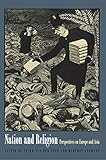Nation and Religion : Perspectives on Europe and Asia / ed. by Peter van der Veer, Hartmut Lehmann.
Material type: TextPublisher: Princeton, NJ : Princeton University Press, [2021]Copyright date: ©1999Description: 1 online resource (208 p.) : 1 mapContent type:
TextPublisher: Princeton, NJ : Princeton University Press, [2021]Copyright date: ©1999Description: 1 online resource (208 p.) : 1 mapContent type: - 9780691219578
- Nationalism -- Religious aspects -- Comparative studies
- Religion and state -- Comparativ studies
- RELIGION / Hinduism / General
- Akihito, Emperor
- Arnold, Thomas
- Bengal: culture
- Brahmans
- Bunyan, John
- Casanova, José
- Christianity
- Colley, Linda
- Das, Chittaranjan
- Disraeli, Benjamin
- Foucault, Michel
- Geertz, Clifford
- Gladstone, William
- Grant, Charles
- Habermas, Jürgen
- Hashim, Abdul
- Ireland: Catholics
- Islam
- Jinnah, Muhammad Ali
- Kaul, Shiv Kishan
- Maududi, Maulana
- Mauss, Marcel
- Napoleon Bonaparte
- Omura Masajiro
- Rammohan Roy
- Shinto
- Sikhs
- Tilak, Pal Gangadhar
- Weber, Max
- ethnology
- fundamentalism
- political parties
- religion
- 322 .1 21
- BL65.S8
- online - DeGruyter
| Item type | Current library | Call number | URL | Status | Notes | Barcode | |
|---|---|---|---|---|---|---|---|
 eBook
eBook
|
Biblioteca "Angelicum" Pont. Univ. S.Tommaso d'Aquino Nuvola online | online - DeGruyter (Browse shelf(Opens below)) | Online access | Not for loan (Accesso limitato) | Accesso per gli utenti autorizzati / Access for authorized users | (dgr)9780691219578 |
Frontmatter -- Contents -- Acknowledgments -- 1. Introduction -- 2. The Moral State: Religion, Nation, and Empire in Victorian Britain and British India -- 3. Protestantism and British National Identity, 1815-1945 -- 4. Race in Britain and India -- 5. History, the Nation, and Religion: The Transformations of the Dutch Religious Past -- 6. On Religious and Linguistic Nationalisms: The Second Partition of Bengal -- 7. Nationalism, Modernity, and Muslim Identity in India before 1947 -- 8. Memory, Mourning, and National Morality: Yasukuni Shrine and the Reunion of State and Religion in Postwar Japan -- 9. Papists and Beggars: National Festivals and Nation Building in the Netherlands during the Nineteenth Century -- 10. Religion, Nation-State, Secularism -- 11. The Goodness of Nations -- Bibliography -- List of Contributors -- Index
restricted access online access with authorization star
http://purl.org/coar/access_right/c_16ec
Does modernity make religion politically irrelevant? Conventional scholarly and popular wisdom says that it does. The prevailing view assumes that the onset of western modernity--characterized by the rise of nationalism, the dominance of capitalism, and the emergence of powerful state institutions--favors secularism and relegates religion to the purely private realm. This collection of essays on nationalism and religion in Europe and Asia challenges that view. Contributors show that religion and politics are mixed together in complex and vitally important ways not just in the East, but in the West as well. The book focuses on four societies: India, Japan, Britain, and the Netherlands. It shows that religion and nationalism in these societies combined to produce such notions as the nation being chosen for a historical task (imperialism, for example), the possibility of national revival, and political leadership as a form of salvation. The volume also examines the qualities of religious discourse and practice that can be used for nationalist purposes, paying special attention to how religion can help to give meaning to sacrifice in national struggle. The book's comparative approach underscores that developments in colonizing and colonized countries, too often considered separately, are subtly interrelated. In addition to the editors, the contributors are Benedict R. Anderson, Talal Asad, Susan Bayly, Partha Chatterjee, Frans Groot, Harry Harootunian, Hugh McLeod, Barbara Metcalf, and Peter van Rooden.
Mode of access: Internet via World Wide Web.
In English.
Description based on online resource; title from PDF title page (publisher's Web site, viewed 30. Aug 2021)


